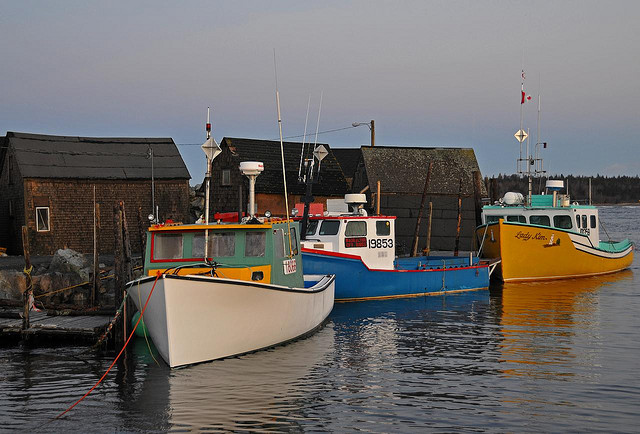Please help rabble.ca stop Harper’s election fraud plan. Become a monthly supporter.
What is it about the Harper government’s special kink about fisheries — and the media’s failure to hold it to account for its unrelenting assault on it and everything related to it (including environment, foreign affairs and the abuse of Parliament) — which, more than anything, reveals the government’s nasty streak?
Consider this episode of fisheries-related Harperism on the international stage. The UN’s Food and Agriculture Organization has drafted guidelines, after five years of member-state consultations, to promote small-scale fisheries worldwide, with the emphasis on sustainability and food security in impoverished countries.
Of nearly 100 countries involved, guess which is the only one not signing — and thereby holding up the procedure under UN rules of unanimity, which could well scuttle it?
The document mentions that it applies to “occupied territories” — covering certain African situations. The Harper government, in a wild jump, is apparently smelling “Palestine” in that and won’t sign. And, of course, it was bending that way anyway — after all, the contagion of “small fisheries” could spread to Canada, displeasing the corporate fishers from whom it gets its advice.
Fisheries has been a rich domain for Harper to trample over because it’s under the radar. Since the cod collapsed some 20 years ago, it has lost profile entirely in the country generally. It has also moved off the front pages of the urban media in Atlantic Canada. Otherwise, this story reported this week — about the 70 scientists and others urging the Harper government to sign the FAO document — would have far more prominence in the region than it has.
A brief history.
One of Harper’s first big moves after coming to power was to trash the Fisheries Act, and the environmental protections it contains. An uproar ensued, including in Tory circles on the West Coast. I slammed the move in a column in March 2007, that went viral in fisheries circles, especially in B.C.
I’ve mentioned this before, but here goes again: a few days later, I got a phone call from an assistant to the deputy minister of fisheries sonorously informing me that “the government of Canada is unhappy with you” — the kind of menacing phone call journalists get in Russia, Iran and other kindred places which, at the current rate, we will eventually resemble.
The uproar slowed them, but they wrecked it on their next try in the name of freebooting resource development. Meanwhile, in a dry run for what’s going on now, Canada, at around the same time, nixed a UN move to restrict fish dragging in international waters.
Stung by criticism and trying to atone, then-fisheries minister Loyola Hearn created the post of “fisheries ambassador,” naming a political crony to it to prove his bona fides. A joke, but at any rate, even such residual sensitivities no longer exist. Fisheries, after all, is mostly seasonal and thus part of the “culture of defeat” and of no account in the Harperist view.
But along with junking environmental laws generally, ripping up the Kyoto treaty, sabotaging environmental progress at international conferences, and declaring environmentalists to be enemies of the state, here, for me, is the worst.
In 2009, the government was prepared to sign a fisheries treaty with the EU that was opposed by the most prominent experts in fisheries — those who had helped create the 200-mile limit, the UN Law of the Sea and other measures in the days when Canada was a leader in oceans-related matters. Among other things, it would potentially give Europeans a say in Canadian fisheries management, plus it had been drafted by the Europeans themselves and naïvely accepted by Harper’s government.
On Dec. 10, 2009, Parliament voted down the treaty (Harper’s government was in a minority then). Then the very next day, in brazen and unprecedented defiance of Parliament and democratic rule, the Harper government signed the treaty anyway.
That was only part of the problem. The other was that it was hardly mentioned at all in the media — not that I could find, anyway. It’s only fisheries, after all.
Let me conclude on his matter of media. The Harper Tories have taken (again) to whinging about “the media” being against them, with the privatization of the CBC being mentioned (again).
On the contrary, the media haven’t laid a finger on them (except for a recent CBC Fifth Estate program that cut them to pieces on the muzzling of scientists — but, then, host Linden MacIntyre is leaving, thanks to another round of cuts).
The national TV networks respectfully report Foreign Minister John Baird’s yapping about “freedom and democracy” elsewhere, without noting that his government is undermining same at every turn in Canada; hardly anyone, except for a few strays like myself, mentions that we now rank among the dirtiest carbon emitters on Earth, and are losing international credibility by the day, and so on.
So actually it’s not just fisheries. Small comfort.
Ralph Surette is a freelance journalist in Yarmouth County. This article was first published in the Chronicle Herald.
Photo: Dennis Jarvis/flickr



